- Home
- Leslie Meier
Haunted House Murder
Haunted House Murder Read online
Books by Leslie Meier
MISTLETOE MURDER
TIPPY TOE MURDER
TRICK OR TREAT MURDER
BACK TO SCHOOL
MURDER
VALENTINE MURDER
CHRISTMAS COOKIE
MURDER
TURKEY DAY MURDER
WEDDING DAY MURDER
BIRTHDAY PARTY MURDER
FATHER’S DAY MURDER
STAR SPANGLED MURDER
NEW YEAR’S EVE MURDER
BAKE SALE MURDER
CANDY CANE MURDER
ST. PATRICK’S DAY
MURDER
MOTHER’S DAY MURDER
WICKED WITCH MURDER
GINGERBREAD COOKIE
MURDER
ENGLISH TEA MURDER
CHOCOLATE COVERED
MURDER
EASTER BUNNY MURDER
CHRISTMAS CAROL
MURDER
FRENCH PASTRY MURDER
CANDY CORN MURDER
BRITISH MANOR MURDER
TURKEY TROT MURDER
SILVER ANNIVERSARY
MURDER
INVITATION ONLY
MURDER
Books by Lee Hollis
Hayley Powell Mysteries
DEATH OF A KITCHEN DIVA
DEATH OF A COUNTRY
FRIED REDNECK
DEATH OF A COUPON
CLIPPER
DEATH OF A CHOCOHOLIC
DEATH OF A CHRISTMAS
CATERER
DEATH OF A CUPCAKE
QUEEN
DEATH OF A BACON
HEIRESS
DEATH OF A PUMPKIN
CARVER
DEATH OF A LOBSTER
LOVER
DEATH OF A COOKBOOK
AUTHOR
DEATH OF A WEDDING
CAKE BAKER
Desert Flowers Mysteries
POPPY HARMON
INVESTIGATES
POPPY HARMON AND THE
HUNG JURY
Books by Barbara Ross
CLAMMED UP
BOILED OVER
MUSSELED OUT
FOGGED INN
ICED UNDER
STOWED AWAY
STEAMED OPEN
SEALED OFF
Published by Kensington Publishing Corporation
HAUNTED HOUSE MURDER
Leslie Meier
Lee Hollis
Barbara Ross
KENSINGTON BOOKS
www.kensingtonbooks.com
All copyrighted material within is Attributor Protected.
KENSINGTON BOOKS are published by
Kensington Publishing Corp.
119 West 40th Street
New York, NY 10018
Copyright © 2019 by Kensington Publishing Corp.
“Haunted House Murder” copyright © 2019 by Leslie Meier
“Death by Haunted House” copyright © 2019 by Lee Hollis
“Hallowed Out” copyright © 2019 by Barbara Ross
All rights reserved. No part of this book may be reproduced in any form or by any means without the prior written consent of the Publisher, excepting brief quotes used in reviews.
Kensington and the K logo Reg. U.S. Pat. & TM Off.
ISBN: 978-1-4967-1996-6
ISBN-10: 1-4967-1996-4
First Kensington Hardcover Edition: September 2019
eISBN-13: 978-1-4967-1998-0
eISBN-10: 1-4967-1998-0
Kensington Electronic Edition: September 2019
Table of Contents
Also by
Title Page
Copyright Page
HAUNTED HOUSE MURDER - Leslie Meier
Chapter One
Chapter Two
Chapter Three
Chapter Four
Chapter Five
Chapter Six
Chapter Seven
Chapter Eight
Chapter Nine
Chapter Ten
DEATH BY HAUNTED HOUSE - Lee Hollis
Chapter One
Chapter Two
Chapter Three
Chapter Four
Chapter Five
Chapter Six
Chapter Seven
Chapter Eight
Chapter Nine
Chapter Ten
Chapter Eleven
Chapter Twelve
Chapter Thirteen
Chapter Fourteen
Chapter Fifteen
Chapter Sixteen
Chapter Seventeen
Chapter Eighteen
Chapter Nineteen
Chapter Twenty
HALLOWED OUT - Barbara Ross
Chapter One
Chapter Two
Chapter Three
Chapter Four
Chapter Five
Chapter Six
Chapter Seven
Chapter Eight
Chapter Nine
Chapter Ten
Chapter Eleven
Chapter Twelve
Chapter Thirteen
HAUNTED HOUSE MURDER
Leslie Meier
Chapter One
“But that place is a death trap! Someone’s going to die in there!”
There was no mistaking the emotion in the speaker’s voice, which rose above a hum of other, discontented voices. Reporter Lucy Stone found herself quickening her steps as she carefully negotiated the steep cement steps that led from the parking lot to the basement meeting room in the town hall. As usual, she was running late, which was rarely a problem when she was covering meetings in the tiny coastal town of Tinker’s Cove, Maine. Experience had taught her that nothing ever started on time, so she had developed the habit of planning to arrive at least fifteen minutes late. She was a busy wife and mother and she didn’t have fifteen minutes to spend twiddling her thumbs while waiting for a meeting to start.
Truth be told, the weekly selectmen’s meetings were usually poorly attended, as the five members debated mundane matters such as adding storm windows to the harbormaster’s shed or arguing whether it would be more cost effective to repair or replace the oldest of the town’s two police cruisers. The meetings were televised on CATV, but hardly anyone watched, and only a few regulars bothered to attend. Those included Stan Wysocki, the town’s resident curmudgeon, and fussbudget Verity Hawthorne, who always brought her knitting. And the media, of course, in the person of Lucy, who worked part-time for the town’s weekly paper, the Pennysaver.
Today, however, she seemed to have miscalculated. That realization hit her when she stepped inside the cement block walled meeting room, which even yellow paint couldn’t brighten, and found that every single folding chair was occupied. Well, taken, not exactly occupied, because emotions were running high and most people were on their feet.
Selectman chairman Roger Wilcox was banging his gavel, attempting to call the meeting to order, but nobody in this crowd of agitated citizens was about to settle down.
“Think of the children!” cried Anna Keller, who had her youngest, barely four months old, nestled against her chest in a Snugli baby carrier. “That place is right across the street from the elementary school!”
“I dread to think what would happen if some kids ventured inside,” added Lydia Volpe, who was a retired kindergarten teacher. “What if the floor gave way, or the stairs?”
“And often, too often, there are kids hanging around the fields, waiting to be picked up after soccer practice or after-school programs,” said Janet Nowicki, who coached a youth soccer team. “You know the town meeting refused to fund a late bus for those kids.”
“It’s up to the town to do something! They should raze it, or let the fire department do a controlled burn,” declared Lori Johnson, whose husband was a firefighter.
“It’s not only dangerous, it’s an eyesore!”
“And I’m afraid it’s going to bring down property values,” predicted Franny Small, a former selectman who happened to live next door to 66 School Street, which Lucy suspected was the property in question. She had often wondered about the house, a once impressive Victorian mansion which now had peeling paint, a sagging porch, and curling shingles. And with Halloween approaching, she wouldn’t be at all surprised if a ghost or two had taken up residency in the tall tower that stood on one side of the formerly stately home.
It was Franny’s dire prediction about property values that caught everyone’s attention, and the chairman was able to seize the moment. “Order! Order! Sit yourselves down,” Roger bellowed, pounding the gavel on the bench. “This is unacceptable. I suggest you organize in some fashion, choose a spokesperson, and put your issue on the agenda for our next meeting.” He banged the gavel again. “We have business to attend to. Item one: Repairs to the bandstand on the town common.”
Franny Small raised her hand.
“Do you have something to say about the bandstand?” asked Roger.
“No.” Franny stood up and smoothed the autumnal silk scarf she’d added to her Talbots cashmere twin set. She was now retired from the costume jewelry company she’d created and sold, for what was reputed to be more than two million dollars, and was considered the town’s wealthiest year-round resident, although she played down that fact pointing out that there were several much wealthier summer residents. “As a former selectperson I would like to remind the chairman that the first item on the agenda is Citizen Concerns. These good people deserve to be heard.”
“Um, yes,” said Roger, looking extremely annoyed. “And I think they’ve made themselves perfectly clear.”
“But you haven’t,” countered Franny. “We haven’t heard a response from the board. What exactly are you going to do about this problem?”
There was a definite buzz from the concerned citizens, who wanted answers from the five members of the town’s governing board.
“Dodging the issues, as always,” muttered Stan.
“If I may,” said Joe Marzetti, a longtime board member who happened to own the town’s grocery store. “I think that since these concerned citizens have gone to the trouble of coming to the meeting that we can tweak the agenda and accommodate them.”
“I don’t . . .” began Roger, but sensing a certain resistance from the other board members, he changed his tune. “Well, if we’re all agreed?”
Receiving nods from the other board members, he turned to insurance broker Jim Moskowitz, who was seated next to him. “What do you think, Jim? Is the town liable?”
Lucy was especially interested in Jim’s response, as her son, Toby, was married to Jim’s daughter, Molly, and they shared a grandson, Patrick, who unfortunately lived in Alaska with his parents.
“I know the property in question and I think it is certainly what we in the business call an attractive nuisance. First things first. Let’s have the building inspector conduct an examination and determine if the building is dangerous, and what should be done about it.”
Lucy found herself nodding along in agreement with Jim’s proposal; lately she had found herself growing closer to him, considering him a sound sort of fellow. She couldn’t quite say the same about his wife, Jolene, whom she was ashamed to admit, she viewed as a competitor for Patrick’s affection.
“And if I may,” said member Fred Rumford, who was a professor at nearby Winchester College. “I suggest we have the town collector investigate and find out who, if anyone, actually owns the property. The town might very well be able to take it for uncollected taxes.”
These proposals were generally met with approval, followed by a small voice. “I have some information. . . .”
“Ah, yes. The chair recognizes building inspector Fred Willets.”
Fred, a very small man with thinning hair and a wispy mustache, stood up and consulted his clipboard. “As it happens, my office has recently received several inquiries from neighbors of the property in question at Sixty-Six School Street, and I conducted a thorough inspection yesterday. From the outside I have to agree that it looks to be in very poor shape, but that is merely surface. The structure itself is remarkably sound; those old folks sure knew how to build. Tax records show the house was constructed over a hundred years ago and I expect it to stand for another hundred.”
“But what about the systems?” demanded Anna, smoothing her baby’s silky head, which was tucked under her chin. “We all know about those gas explosions in Massachusetts.. . .”
“There’s no gas in the house,” said Fred. “The boiler is oil fired and was installed a few years ago. The wiring is up to code, and so is the plumbing. Someone could move in there tomorrow.”
Frankie LaChance, who was the town’s foremost real estate broker, as well as Lucy’s friend and neighbor, was raising her hand.
“Ah, Ms. LaChance,” said Roger, beaming as he recognized the attractive woman who was dressed as usual in business casual, wearing a quilted green jacket over her silky blouse. “Perhaps you have some information to share?”
“I do,” said Frankie, tossing her auburn curls and smiling broadly. “I’m happy to say that Sixty-Six School Street is under agreement and the closing is imminent.”
This news generated a certain excitement as everyone wondered who the buyers might be. Someone who already lived in town, or newcomers?
“They’re a lovely young couple. Ty and Heather Moon. They are relocating from Portland where they lived in a tiny condo, and are very excited about the antique home’s unique features and potential for a truly spectacular renovation, its generous square footage and the spacious yard, which is over an acre. I suspect they are thinking of starting a family.”
The next question on everyone’s mind, including Lucy’s, was the price. Frankie wasn’t about to reveal it, but she did offer a clue. “The owners . . . you may remember Hilda and Bob Edmiston? They moved into assisted living a few years ago, intending for their son to manage the property, but he got a job in California and moved out there. There was no one taking care of repairs and maintenance, which was unfortunate.”
Lucy took this to mean that the Moons got a good deal.
“In the end, the Edmistons are very relieved that the house will be in good hands in the future,” concluded Frankie.
Make that a very good deal, decided Lucy, making a note to follow up tomorrow with a call to Frankie. She noticed that the emotional temperature in the room had definitely cooled, and people were gathering up their belongings, chatting quietly as they made their way to the door. The room was soon back to normal, with Stan and Verity in their usual seats, as well as a handful of town officials who were there to advise the board members on agenda items.
“Item one,” announced Roger, with a tap of his gavel. “Bandstand repairs. Fred, what’s the situation?”
Lucy yawned, realizing the meeting was going to run late and trying to keep her mind on the much less interesting items that remained on the rather lengthy agenda. But instead, she found herself speculating about Verity’s knitting, which it seemed she had been working on for a very long time. It was a horrible shade of green and there seemed to be a lot of it. Was it a sweater for a very large relative? An afghan for a hopefully color-blind friend? A camouflage cover for a tank? Whatever it was, she concluded, watching as Verity’s needles clicked away, there seemed to be no end in sight.
* * *
Next morning, Lucy got to work later than usual. Phyllis, the receptionist at the Pennysaver, looked up from her spot behind the reception counter when the little bell on the door announced her arrival. “Late night?” asked Phyllis, peering at Lucy over her tiger-striped cheaters, which matched her bright orange sweater. Phyllis observed all the holidays, and this was one of her Halloween outfits.
“I didn’t get home ’til after midnight,” said Lucy, yawning as she hung up her fleece jacket. She then went
straight for the coffeepot and filled her #1 Mom mug, looking up as the bell on the door jangled again, announcing the arrival of Ted Stillings. “Concerned citizens hijacked the agenda.”
“What were the citizens concerned about?” asked Ted, who was the Pennysaver’s publisher, editor, and chief reporter. He’d inherited the paper, as well as his prized antique roll-top desk and the Regulator clock that hung on the wall above it, from his grandfather, a nationally renowned journalist.
“That old haunted house opposite the elementary school,” said Lucy. “They’re concerned it poses a danger to the kids.”
“I suppose they have a point,” conceded Ted, hanging his barn coat on the stand next to the little table containing the coffeepot. “What’s the town going to do? Raze it?”
“Nope,” said Lucy, taking a long drink of coffee. “It’s under agreement. New people bought it.”
“That old wreck?” asked Phyllis.
“The building inspector says it’s not a wreck at all; it’s structurally sound underneath all that peeling paint.”
Ted filled his Best Boss mug with coffee and stirred in a couple of packets of sugar and a healthy dollop of fake cream, then took a sip. “That sounds like a good story, Lucy,” he said, adding another packet of sugar. “Historic home saved from wrecking ball.”
“Actually, I think the suggestion was to have the fire department do a controlled burn, for practice,” said Lucy, furrowing her brow as she seated herself at her desk. “And if all that sugar doesn’t kill you, that fake creamer will.”
Ted added a bit more creamer and resumed stirring his coffee. “It’ll be a great seasonal story,” he continued, ignoring her objection. “We’ll put a big photo of the house right on the front page, above the fold. Maybe jazz it up with a full moon and a bat, something like that. It’s amazing what you can do with photos these days. A real Halloween haunted house.”
“Whatever happened to journalistic integrity?” asked Lucy.

 Christmas Card Murder
Christmas Card Murder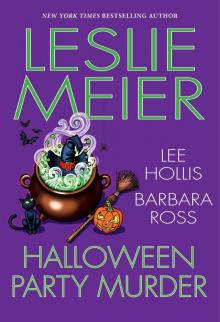 Halloween Party Murder
Halloween Party Murder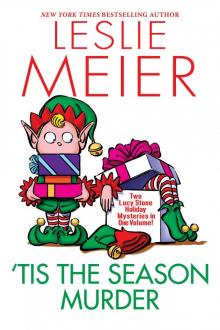 'Tis the Season Murder
'Tis the Season Murder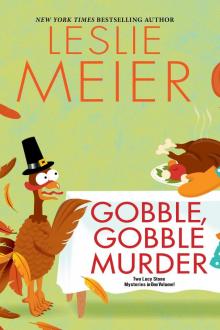 Gobble, Gobble Murder
Gobble, Gobble Murder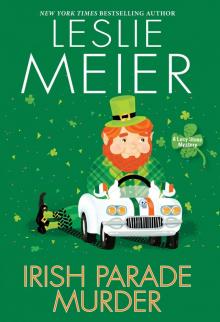 Irish Parade Murder
Irish Parade Murder Bake Sale Murder
Bake Sale Murder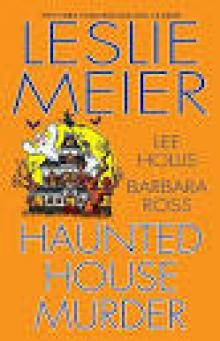 Haunted House Murder
Haunted House Murder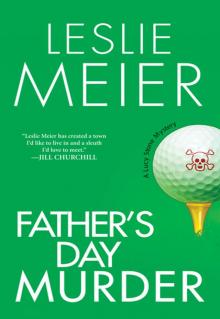 Father’s Day Murder
Father’s Day Murder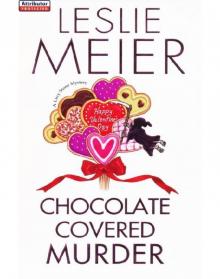 Chocolate Covered Murder
Chocolate Covered Murder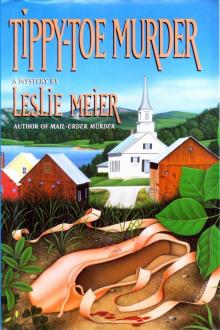 Tippy Toe Murder
Tippy Toe Murder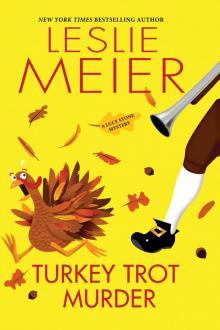 Turkey Trot Murder
Turkey Trot Murder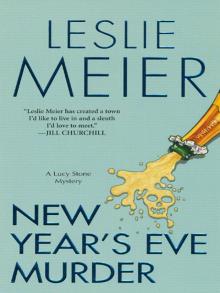 New Year's Eve Murder
New Year's Eve Murder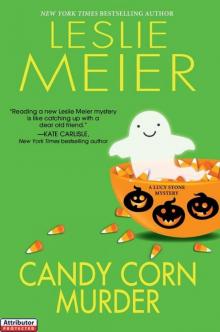 Candy Corn Murder
Candy Corn Murder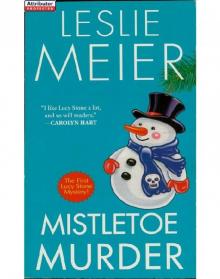 Mistletoe Murder
Mistletoe Murder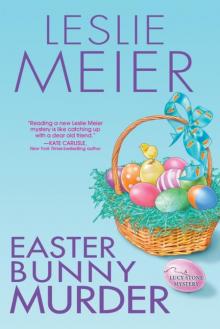 LStone 20 - Easter Bunny Murder
LStone 20 - Easter Bunny Murder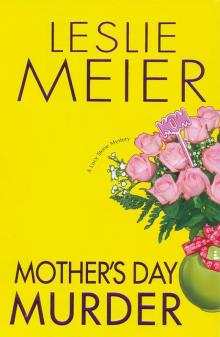 Mother's Day Murder
Mother's Day Murder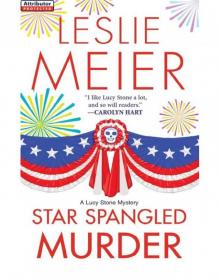 Star Spangled Murder
Star Spangled Murder Silver Anniversary Murder
Silver Anniversary Murder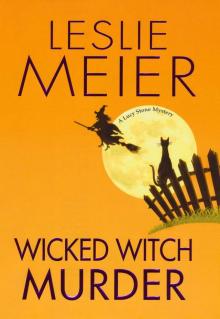 Wicked Witch Murder
Wicked Witch Murder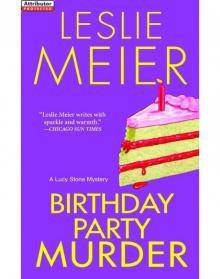 Birthday Party Murder
Birthday Party Murder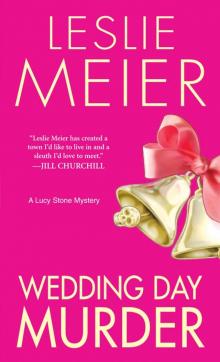 Wedding Day Murder
Wedding Day Murder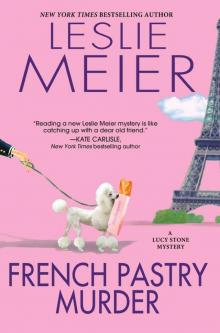 French Pastry Murder
French Pastry Murder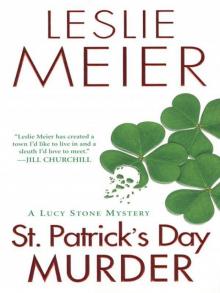 St. Patrick's Day Murder
St. Patrick's Day Murder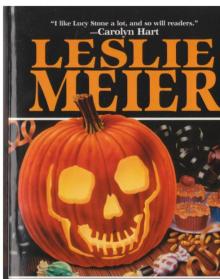 Trick or Treat Murder
Trick or Treat Murder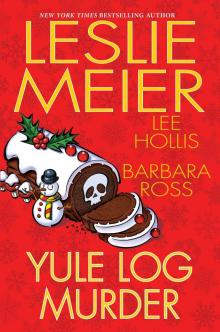 Yule Log Murder
Yule Log Murder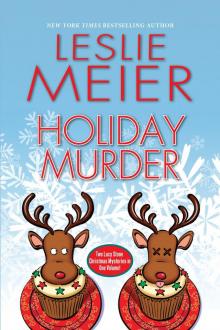 Holiday Murder
Holiday Murder British Manor Murder
British Manor Murder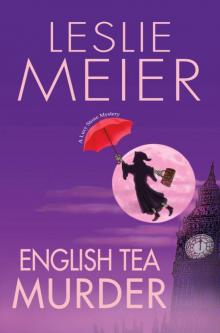 English Tea Murder
English Tea Murder